2023年外研版中考英语一轮复习 第三节 七年级下册 Module 1 ~ Module 6课件(共95张PPT)
文档属性
| 名称 | 2023年外研版中考英语一轮复习 第三节 七年级下册 Module 1 ~ Module 6课件(共95张PPT) | 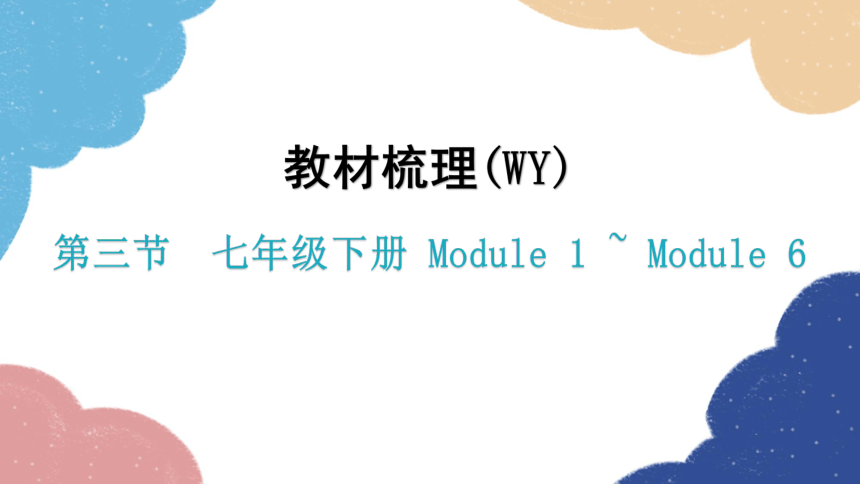 | |
| 格式 | pptx | ||
| 文件大小 | 650.5KB | ||
| 资源类型 | 教案 | ||
| 版本资源 | 外研版 | ||
| 科目 | 英语 | ||
| 更新时间 | 2023-06-02 17:18:21 | ||
图片预览

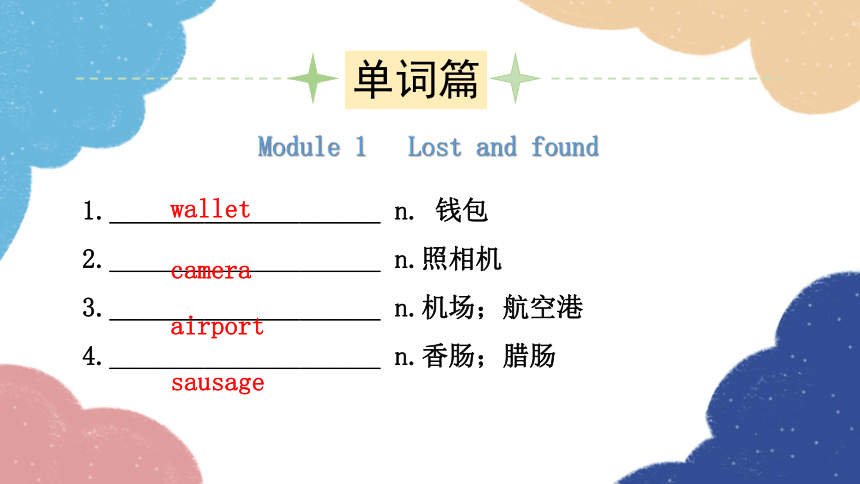
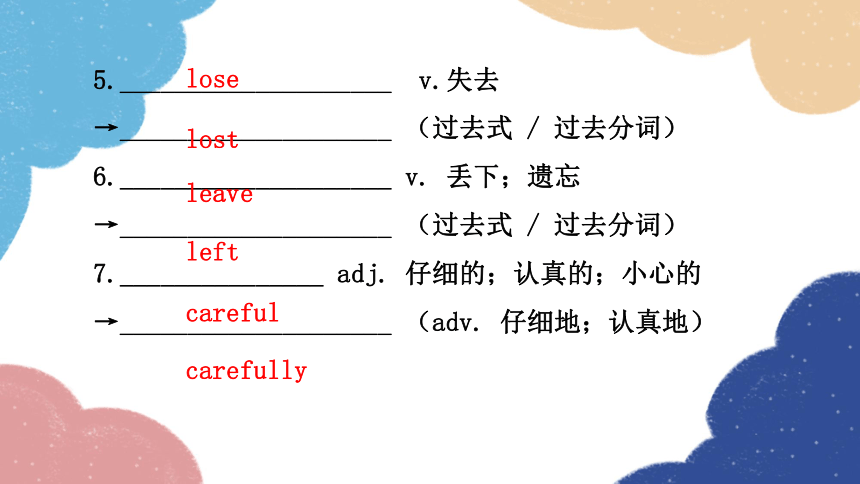
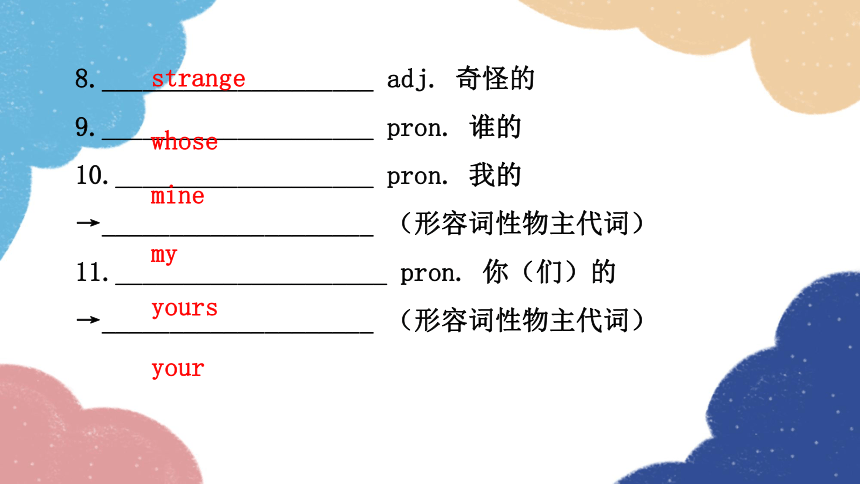
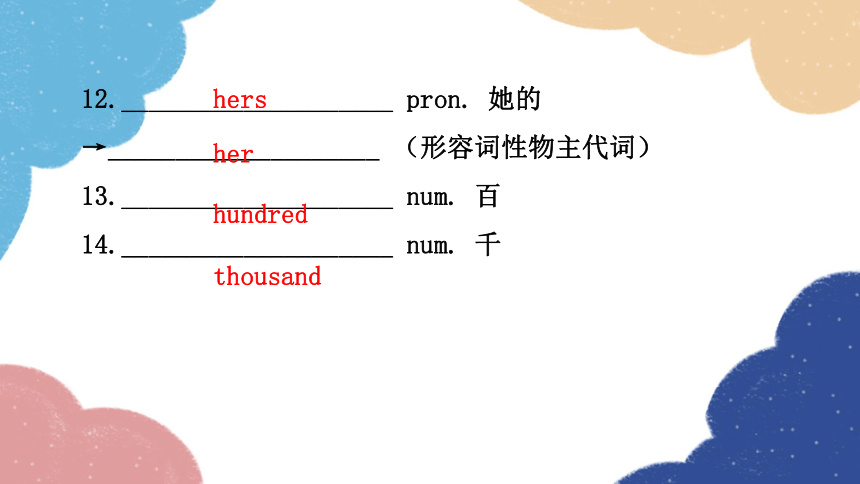
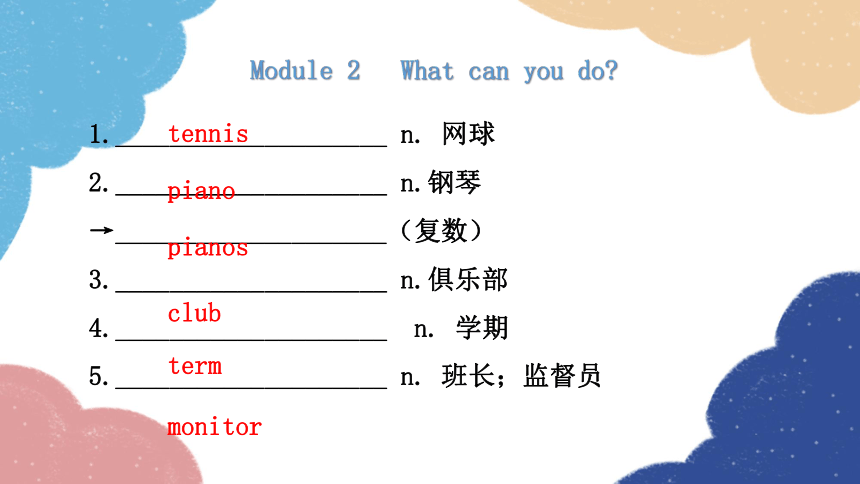
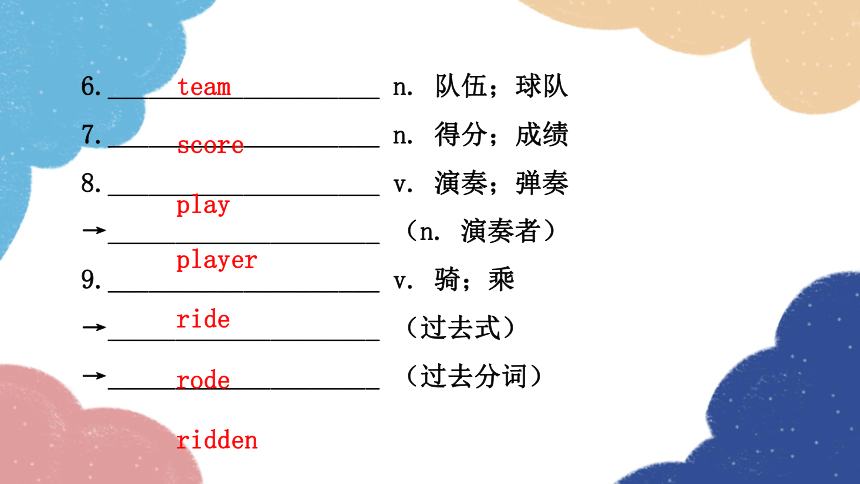
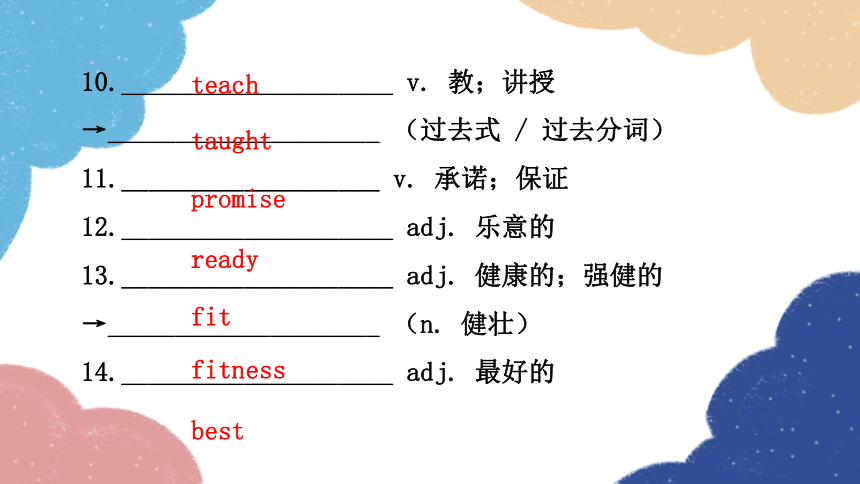
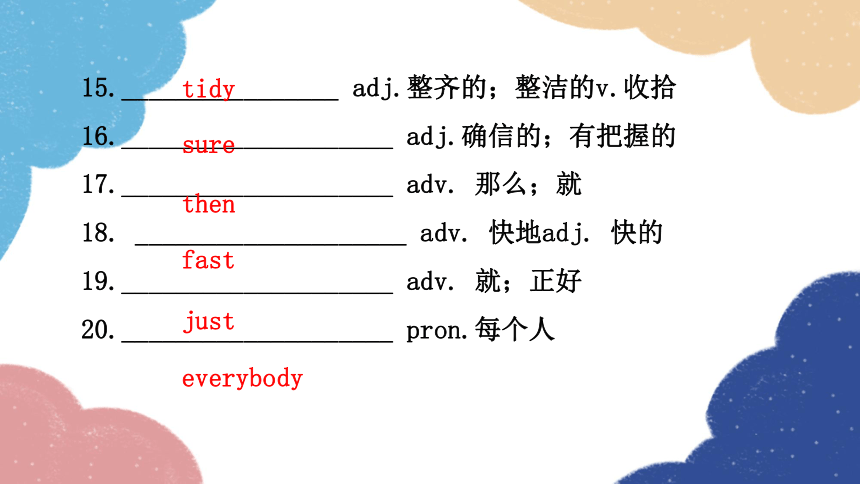
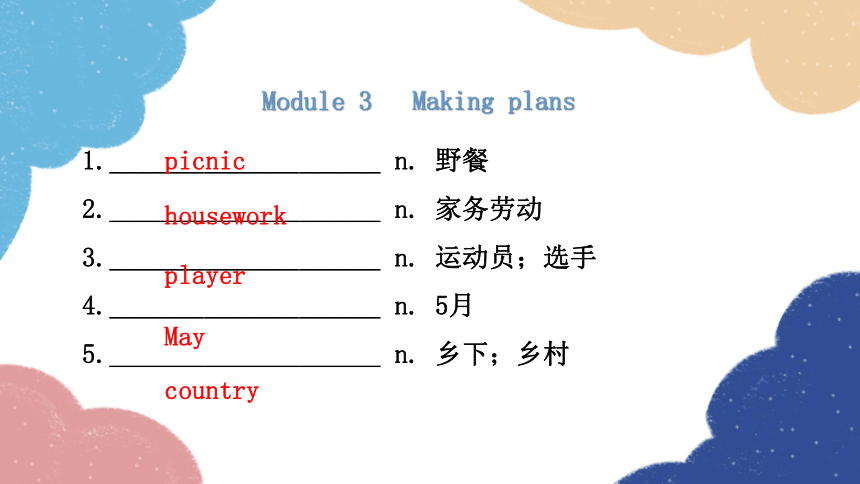
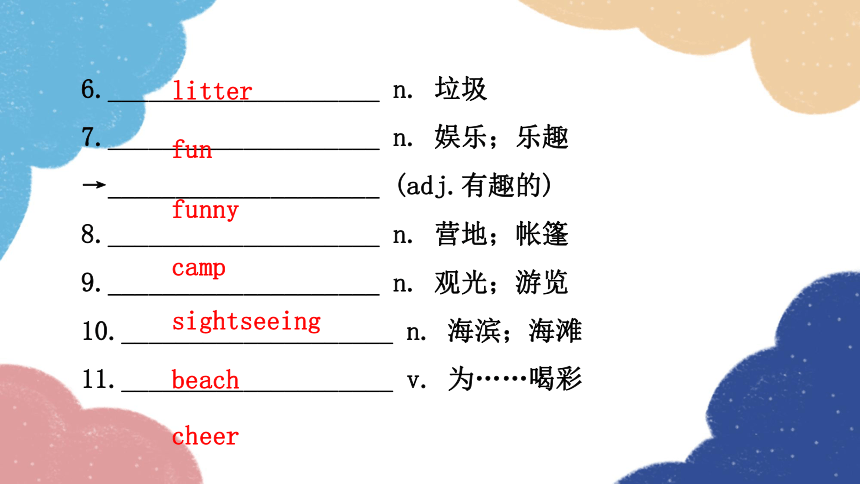
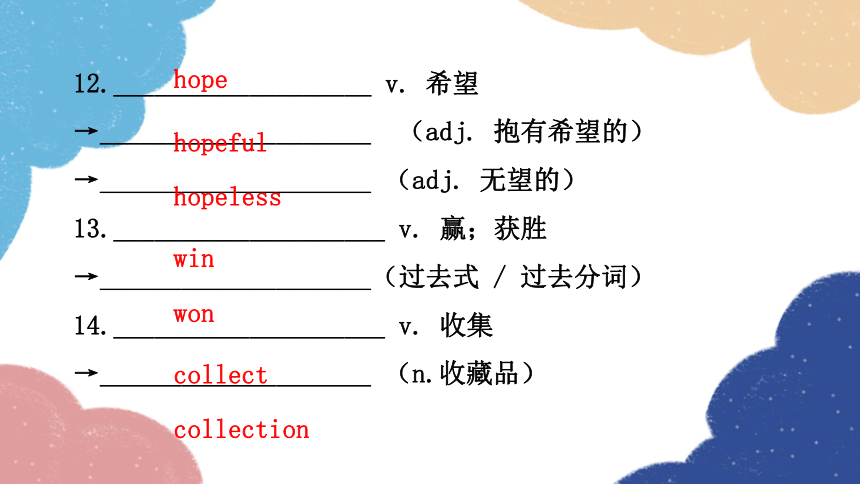
文档简介
(共95张PPT)
教材梳理(WY)
第三节 七年级下册 Module 1 ~ Module 6
Module 1 Lost and found
单词篇
1.____________________ n. 钱包
2.____________________ n.照相机
3.____________________ n.机场;航空港
4.____________________ n.香肠;腊肠
wallet
camera
airport
sausage
5.____________________ v.失去
→____________________ (过去式 / 过去分词)
6.____________________ v. 丢下;遗忘
→____________________ (过去式 / 过去分词)
7._______________ adj. 仔细的;认真的;小心的
→____________________ (adv. 仔细地;认真地)
lose
lost
leave
left
careful
carefully
8.____________________ adj. 奇怪的
9.____________________ pron. 谁的
10.___________________ pron. 我的
→____________________ (形容词性物主代词)
11.____________________ pron. 你(们)的
→____________________ (形容词性物主代词)
strange
whose
mine
my
yours
your
12.____________________ pron. 她的
→____________________ (形容词性物主代词)
13.____________________ num. 百
14.____________________ num. 千
hers
her
hundred
thousand
Module 2 What can you do
1.____________________ n. 网球
2.____________________ n.钢琴
→____________________(复数)
3.____________________ n.俱乐部
4.____________________ n. 学期
5.____________________ n. 班长;监督员
tennis
piano
pianos
club
term
monitor
6.____________________ n. 队伍;球队
7.____________________ n. 得分;成绩
8.____________________ v. 演奏;弹奏
→____________________ (n. 演奏者)
9.____________________ v. 骑;乘
→____________________ (过去式)
→____________________ (过去分词)
team
score
play
player
ride
rode
ridden
10.____________________ v. 教;讲授
→____________________ (过去式 / 过去分词)
11.___________________ v. 承诺;保证
12.____________________ adj. 乐意的
13.____________________ adj. 健康的;强健的
→____________________ (n. 健壮)
14.____________________ adj. 最好的
teach
taught
promise
ready
fit
fitness
best
15.________________ adj.整齐的;整洁的v.收拾
16.____________________ adj.确信的;有把握的
17.____________________ adv. 那么;就
18. ____________________ adv. 快地adj. 快的
19.____________________ adv. 就;正好
20.____________________ pron.每个人
tidy
sure
then
fast
just
everybody
Module 3 Making plans
1.____________________ n. 野餐
2.____________________ n. 家务劳动
3.____________________ n. 运动员;选手
4.____________________ n. 5月
5.____________________ n. 乡下;乡村
picnic
housework
player
May
country
6.____________________ n. 垃圾
7.____________________ n. 娱乐;乐趣
→____________________ (adj.有趣的)
8.____________________ n. 营地;帐篷
9.____________________ n. 观光;游览
10.____________________ n. 海滨;海滩
11.____________________ v. 为……喝彩
litter
fun
funny
camp
sightseeing
beach
cheer
12.___________________ v. 希望
→____________________ (adj. 抱有希望的)
→____________________ (adj. 无望的)
13.____________________ v. 赢;获胜
→____________________(过去式 / 过去分词)
14.____________________ v. 收集
→____________________ (n.收藏品)
hope
hopeful
hopeless
win
won
collect
collection
15.____________________ adj. 愚蠢的;傻气的
16.____________________ adj. 极好的
17.____________________ adv. 其他;另外
18.____________________ adv. 向前
19.____________________ prep. 在……期间
20.____________________ pron. 没有人
silly
fantastic
else
forward
during
nobody
21._________________ pron. 没有什么;没有东西
22.____________________ pron. 我自己
23.____________________ num. 第二
→____________________ (基数词)
nothing
myself
second
two
Module 4 Life in the future
1.____________________ n. 将来;未来
2.____________________ n.生活;生命
→____________________ (复数)
3.____________________ n.问题
4.____________________ n. 天空;空中;空气
5.____________________ n. 陆地
future
life
lives
question
air
land
6.____________________ n.机器
7.____________________ n. 机器人
8.____________________ n. 海;海洋
9.____________________ n. 太空;空间
10.____________________ n. 交通
11.____________________ n. 堵塞;拥挤
machine
robot
sea
space
traffic
jam
12.____________________ v. 拿;带
13.____________________ v.&n. 改变;变化
14.____________________ v.&v.aux. 需要
15.____________________ v.aux.将;将要;将会
→____________________ (过去式)
16.____________________ v. 升起;上升
→____________________ (过去式)
→____________________ (过去分词)
carry
change
need
will
would
rise
rose
risen
17.____________________ adj. 能够……的
→____________________ (adj. 不能……的)
18.______________ adj. (时间)空闲的;空余的
→____________________ (n. 自由)
→____________________ (adv. 自由地)
19.____________________ adj. 真的;真实的
→____________________ (adv. 真实地)
able
unable
free
freedom
freely
true
truly
20.____________________ adj.便宜的
21.____________________ adj. 繁重的;沉的
22.________________ adj. 轻的;轻松的;少量的
23.____________________ adv. 也许
24.___________________ adv. 到处;处处
25.____________________ pron. 每样事物;每件事
cheap
heavy
light
maybe
everywhere
everything
Module 5 Shopping
1.____________________ n. 市场
2.____________________ n. 尺码;号
3.____________________ n. 价格
4.____________________ n. 有利条件;优势
→____________________ (n. 不利条件)
market
size
price
advantage
disadvantage
5.____________________ n. 产品
6.____________________ n. 购物
7.____________________ n. 方式;道路
8.________________ v. 穿(某尺寸的衣服或鞋子)
9.____________________ v. 尝试;试穿;品尝
10.____________________ v. 比较
product
shopping
way
take
try
compare
11.____________________ v. 支付;付钱
→____________________ (过去式 / 过去分词)
12.____________________ v. 收到;接到
13. ____________________ adj. 新鲜的
14. ____________________ adj. 安全的
15. ____________________ adj. 营业的;开放的
pay
paid
receive
fresh
safe
open
16.____________________ adv. 当然;行
→____________________ (adj. 确定的;无疑的)
17. ____________________ adv. 几乎;差不多
certainly
certain
almost
Module 6 Around town
1.____________________ n. 银行
2.____________________ n. 博物馆
3.____________________ n. 游客
4.____________________ n. 地铁
5.______________ n. (短期的)参观,游览;旅行
bank
museum
tourist
underground
tour
6.____________________ n. 广场
7.____________________ n. 油画;绘画
8.____________________ n. 米
9.____________________ n. 桥
10.____________________ n.铁路
11.____________________ n.教堂
→____________________(复数)
square
painting
metre
bridge
railway
church
churches
12.____________________ v.穿过
13.____________________ v.原谅;谅解
14.____________________ v.结束;完成
15.____________________ adj.著名的
16.____________________ adj.(天气)晴朗的
17.____________________ adj.高的
cross
excuse
finish
famous
clear
high
18.____________________ prep.沿着
19.____________________ prep. 越过
20.____________________ prep.在……的对面
21.____________________ prep.在……上方
22.____________________ num.第三
→____________________(基数词)
along
across
opposite
above
third
three
短语篇
1. 首先;第一 ____________________
2. 小心(对待)…… ____________________
3. 从现在开始 ____________________
4. 匆匆忙忙 ____________________
5. 几百;成百上千 ____________________
6. 寻找 ____________________
first of all
be careful with
from now on
in a hurry
hundreds of
look for
7. 想要;希望 ____________________
8. 与某人相处融洽 ____________________
9. 担心…… ____________________
10. 乐于做某事 ____________________
11. 承诺做某事 ____________________
12. 复习;练习 ____________________
would like
get on well with sb.
worry about
ready to do sth.
promise to do sth.
go over
13. 盼望 ____________________
14. 交朋友 ____________________
15. 过得愉快 ____________________
16. 散步 ____________________
17. 观光 ____________________
18. 将来____________________
19. 能够做…… ____________________
look forward to
make friends
enjoy oneself
take a walk
go sightseeing
in the future
be able to
20. 不再…… ____________________
21. (希望、梦想等)实现,成真 ________________
22. 不仅……而且…… _______________________
23. 和;又;也 ____________________
24. 为……付钱 ____________________
25. 试穿 ____________________
26. 总有一天 ____________________
not … any more
come true
not only … but also …
as well
pay for
try on
one day
27. ……之一 ____________________
28. 外出;游玩 ____________________
29. 别急;稍等一会 ____________________
30. 劳驾,对不起 ____________________
31. 为什么不……呢? ____________________
32. 通过邮寄 ____________________
33. 去……的路 ____________________
34. 沿着街道直走 ____________________
one of
go out
wait a minute
excuse me
Why not …?
by post
the way to
go along the street
课文篇
句式复习
1. 这些蜡笔是你的吗?
______________________________________________
2. 他们把东西落在飞机、火车、公交车和出租车上。
____________________________________________________________________________________________
Are these crayons yours?
They leave things on planes, on trains, on buses and in taxis.
3. 我中文说得不太好。
___________________________________________
4. 选我吧,我们可以一起把教室变漂亮。
___________________________________________
___________________________________________
5. 周末你打算做什么?
___________________________________________
I can' t speak Chinese very well.
Choose me and we can make our classroom beautiful.
What are you going to do at the weekend?
6. 我打算在五一假期好好玩一玩。
___________________________________________
___________________________________________
7. 老师们将不再用粉笔在黑板上写字,学生们也将不再使用钢笔、纸或橡皮!
___________________________________________
______________________________________________________________________________________
I' m going to enjoy myself during the May Day holiday.
Teachers won' t use chalk on a blackboard and students won' t use pens and paper,or erasers any more!
8. 工作时间将会变短,所以人们将会拥有长假期。
______________________________________________________________________________________
9. 她穿多大号的?
___________________________________________
10. 现在有很多新型的购物方式,网上购物就是其中的一种。
______________________________________________________________________________________
Working hours will be short so people will have long holidays.
What size does she take?
There are many new ways of shopping, and online shopping is one of them.
11. 您能告诉我怎么去到(中国)国家体育场吗?
______________________________________________________________________________________
12. 穿过东长安街,沿着这条街道走,在左边的第三条街道向左拐。
______________________________________________________________________________________
Could you tell me how to get to the National Stadium?
Go across Dong Chang' an Jie, go along the street and turn left at the third street on the left.
语篇再现
Passage 1
【七年级下册 Module 2】
I' d like to be the class monitor. I get on well 1.__________ everyone, classmates and teachers. I work very hard, and I do well at school. I' m kind and I' m always 2.__________ to help others. I can even help teachers too. 3.__________ me as your class monitor and I promise to help YOU!
with
ready
Choose
I want to be the PE 4.__________. I enjoy sport, and I can run really 5.__________. I' m really fit and healthy. Just watch me in the playground between lessons! I play most ball games well. But I' m really good at football, and I play basketball in the school team. I usually get the best 6.__________ in every match. Choose me for the PE monitor and you can get the best score too!
monitor
fast
score
Passage 2
【七年级下册 Module 3】
I' m looking forward to the football match tomorrow. My friends and I 1.__________ going to watch our favourite team. We' re going to meet other fans, and make some new 2.__________. We' re all going to wear the team shirt, and we' re going to 3.__________ the players. I hope they 4.__________ the match.
are
friends
cheer
win
I' m going to enjoy 5.__________ during the May Day holiday. On the morning of 1st May, I' m going to get up late and then read a book. In the afternoon I' m going out 6.__________ my family and friends. We' re going to take a 7.__________ in the country or go swimming. And on 2nd May we' re going to 8.__________ litter in the park near my friend' s house. It' s going to be a great holiday—busy but good fun!
myself
with
walk
collect
考点篇
Welcome to the Central Park Lost and Found Office. Every weekend many parents and ____1____ children come to our park and play here.Some of ____2____ are not careful with their things.They often
考点1
名词性物主代词【七年级下册 Module 1】
专练
their
them
leave their things in the park,for example,their bikes,their keys or their mobile phones.
Therefore, we set up the lost and found office for them.Do you often come to our park Are you looking for ____3____ lost things Come to our office and have a look at the things.Today we find some things near the bench.Are they ____4____ You can call us.
your
yours
( )1.A.they B.their C.theirs
( )2.A.they B.their C.them
( )3.A.you B.your C.yours
( )4.A.you B.your C.yours
B
C
B
C
点拨
名词性物主代词表示“……的”,相当于“形容词性物主代词+名词”,其后不能接名词。(详解见主书第一部分[第一节 名词])
考点2
look for, find和find out的区别【七年级下册 Module 1】
( )1. It' s hard to ____________________ a job.
A. look for B. finding C. find
( )2. I' m ____________________ my pen.
A. look for B. looking for C. finding
专练
C
B
( )3. Please____________________ the answer to the question.
A. find out B. find C. look for
A
点拨
比较项 含义及用法
look for 意为“寻找”,强调“找”的动作和过程
find 意为“找到;发现”,强调“找”的结果
find out 意为“查明;弄清”,强调经过研究、调查而得知
考点3
情态动词can【七年级下册 Module 2】
( )1.—__________ you swim
—No, I can' t. So my parents always ask me to learn to swim.
A. Must B.May C. Can
( )2.She can __________ a little Chinese.
A. to speak B. speaks C. speak
专练
C
C
点拨
情态动词can表示能力时,意为“能;会”;表示请求时,意为“可以”。can后面的动词用原形,其否定形式为cannot或can' t。(详解见主书第一部分[第二节 动词])
考点4
一般将来时:be going to【七年级下册Module 3】
We have got over 1,000 letters,faxes and emails from our readers about their New Year' s resolutions(决心).Many readers 1.___________________ (work)harder in school this year.Lots of readers are going to play sports.Some readers are going to eat more vegetables.One lady 2.________________ (leave) her job and she 3.__________ (want) to find a new job as a language teacher in China.
专练
根据句意,用所给单词的适当形式填空
are going to work
is going to leave
wants
点拨
“be going to+动词原形”用于人主观上计划或安排将要去做的事情,常用于一般将来时。(详解见主书第一部分[第十节 谓语动词的时态])
考点5
“go+动词-ing形式”结构的常见短语【七年级下册 Module 3】
1. 这个冬天去滑雪怎么样?
How about ____________________ this winter
2. 保罗上周独自去钓鱼。
Paul ____________________ alone last week.
专练
根据汉语意思完成句子,词数不限
going skiing
went fishing
3. 你是去山里远足、去观光还是品尝了很多美味的食物?
Did you ____________________ in the mountains, ____________________ or taste lots of delicious food
go hiking
go sightseeing
点拨
“go+动词-ing形式”结构的常见短语:
go sightseeing 去观光
go shopping 去购物
go camping 去野营
go swimming 去游泳
go skating 去滑冰
go fishing 去钓鱼
go climbing 去爬山
go hiking 去远足
go skiing 去滑雪
1.They will visit the Olympic Sports Centre next year.(就画线部分提问)
________ ________ _________ _________ the Olympic Sports Centre
考点6
一般将来时:will【七年级下册Module 4】
专练
根据要求完成句子,每空一词
When
will
they
visit
2.We clean our classroom every day.(用tomorrow改写句子)
We __________ _________ our classroom ______________.
3.Will your friends come to the party (作否定回答)
________ , __________ ________________.
will
clean
tomorrow
No
they
won' t
(1)will表示客观上未来势必会发生的事实或对未来的预测,常用于一般将来时,常见的时间状语有:tomorrow, next week, this afternoon等。(2)will没有人称和数的变化,其构成形式为:will+动词原形。
(3)will的否定形式为:在will后直接加not,构成will not,或缩略为won' t。(4)表示will的疑问形式时,需将will提到句首。(详解见主书第一部分[第十节 谓语动词的时态])
点拨
1. She can' t explain it and I can' t _____________.
2. My friend speaks English and he speaks German ____________________.
3. We will buy a new sofa and ____________ a new coffee table.
考点7
as well, also, too和either的区别【七年级下册Module 4】
专练
根据句意,用as well, also, too或either填空
either
as well / too
also
点拨
比较项 用法
as well 用在肯定句中,一般放在句尾
also 用在肯定句中,一般放在be动词、助动词、情态动词之后,实义动词之前
too 用在肯定句中,一般放在句尾,可用逗号和前面的句子隔开,也可不用
either 通常只用在否定句中,且要放在句尾
( )1. Not only Li Ming but also I _______ students.
A. am B. is C. are
( )2. Not only ____________________ run this machine, but ____________________ repair it.
A. he can; he can B. can he; he can
C. he can; can he
考点8
not only … but also … 的用法【七年级下册Module 4】
专练
A
B
( )3. ________ my father ___________ my mother is able to drive a car. So there are two cars parking in front of my house.
A. Both; and B. Either; or
C. Not only; but also
C
(1)not only … but also … 意为“不仅……而且……”,用于连接两个表示并列关系的成分,着重强调后者,其中的also和but有时可以省略其中之一。(2)若连接两个成分作主语时,其谓语动词通常遵循“就近一致”的原则。(3)not only放在句首时,其后接的句子要用倒装结构,but also后的句子语序不变。
点拨
where, what, why, how much
考点9
特殊疑问句【七年级下册 Module 5】
专练
根据句意,从方框中选择恰当的特殊疑问
词(组)填空
1.—____________ are you late
—Because it is raining heavily outside.
Why
2.—_________ is your father
—He is a doctor.
3.—__________ are you going
—We are going to the library.
4.—______________ milk is left in the fridge
—There is only little.
What
Where
How much
常见的特殊疑问词有:where (在哪里),what (什么),when (什么时候),which (哪一个;哪一些),who (谁), why (为什么), how (怎样)。提问可数名词的数量时用 how many,提问不可数名词的数量时用how much。(详解见主书第一部分[第十二节 句子种类及简单句])
点拨
1. There are ____________ books in the bookshop.
2. The shoes are ________________ small for me.
3. There is ____________________ salt in the soup.
考点10
too much, too many和much too的区别
【七年级下册 Module 5】
专练
根据句意,用too much, too many或much too填空
too many
much too
too much
点拨
比较项 含义及用法
too much 意为“太多”,相当于much,后接不可数名词作定语,也可作表语
too many 意为“太多”,相当于many,后接可数名词复数形式
much too 意为“太”,相当于too,后接形容词或副词
1.树在房子的前面。
The trees are ____________________ the house.
2.银行在电影院的左边。
The bank is ____________________ the cinema.
考点11
方位的表达方式【七年级下册 Module 6】
专练
根据汉语意思完成句子,词数不限
in front of
on the left of
3.在公园和学校之间有一家餐馆。
There is a restaurant _____________ the park __________the school.
between
and
in front of意为“在……的前面”;between … and … 意为“在……和……之间”;on the left / right of … 意为“在……的左边 / 右边”。(详解见主书第一部分[第六节 介词])
点拨
1. The train is going ___________ the tunnel.
2. You have to go _______________ the street if you want to get to the library.
考点12
cross, along, across, through和past的区别【七年级下册 Module 6】
专练
根据句意,用cross, along, across, through或
past填空
through
across / along
3. Please be careful when you ________ the street.
4. She waved as she drove _____________.
5. I' m dropping white stones _____________ the way.
cross
past
along
点拨
比较项 词性及词义 用法
cross 动词,意为“横跨;横渡;穿过” 后接road, street, bridge, river等名词,表示从物体表面上穿过
along 作介词时,意为“沿着” 表示沿着细长的线移动,如道路、河流、海岸等
across 作介词时,意为“越过;横穿” 指从物体表面的一边到另一边
比较项 词性及词义 用法
through 作介词时,意为“穿过” 表示通过某一空间或从物体的内部穿过
past 作介词时,意为“路过;越过” 表示从旁边经过,走过
演练篇
一、完形填空
My name is Michell. My mother is a German teacher, but we live in Poland. Polish is my native language. I learned English very well and now I want to share my experience with you.
When I was six, my dad ____1____ me to listen to the Beatles. I listened to them every day for the ____2____ seven years. In the beginning, I could understand nothing of what they were singing. But soon I started to understand more words, ____3____ the ones which appeared in the titles.
encouraged
next
especially
Today, I can understand the Beatles very clearly. Each time I hear a Beatles' song, I am happy and ____4____ because I have made my childhood dream come true. I can understand the lyrics(歌词) of the songs I ____5____. And that gives me ____6____ for many hours every day.
proud
listen to
pleasure
When I was 13 years old, I started reading science fiction books. I read in Polish. Somehow I felt that in English the books would be even more ____7____. I finally decided to read books in English. I learned every new English word that I met.
interesting
Every time I learnt a new word, I ____8____ that my reading ability was improving. At some point, I read my first whole ____9____ in English and I understood it. That moment was a breakthrough (突破) in my life. My dad said to me, “You have broken a barrier(障碍) and ____10____ a new world!”
felt
book
got into
( )1. A. encouraged B. created
C. recorded D. considered
( )2. A. final B. busy C. difficult D. next
( )3. A. nearly B. exactly
C. normally D. especially
( )4. A. fantastic B. worried C. proud D. tired
( )5. A. talk about B. look at
C. listen to D. join in
A
D
D
C
C
( )6. A. pleasure B. influence
C. secrets D. safety
( )7. A. private B. correct
C. boring D. interesting
( )8. A. smelt B. tasted C. sounded D. felt
( )9. A. book B. magazine
C. newspaper D. dictionary
( )10. A. fell into B. got into
C. divided into D. turned into
A
D
D
A
B
二、阅读理解(C篇)
配对阅读。左栏是对五位学生的父亲的介绍,右栏是对七间商店的介绍,请为左栏的每一位学生匹配一间适合购买礼物的商店,并将其字母编号填写在题号前的括号内。
( )11. Eric' s father works in a big company. He always wears a suit to work. ( )12. Sam' s father is a programmer. He spends a lot of time in front of computers. A. Shop now at one of the latest suppliers of chess sets, pieces, boards and other supplies. We offer the best prices in town!
B. A tie can say a lot about the person who wears it. High quality silk ties for men are on sale in our store. You can always find one here to match your suit.
B
D
( )13. Rebecca' s father works at anairport. He loves playing chess in his free time. ( )14. Sarah' s father is a high school art teacher. He is really good at Chinese painting. C. A smart watch helps you stay connected at all times with smart notifications for texts, calls, reminders, and alarms.
A
E
( )15. Benny' s father is a doctor. Sometimes he works very late and loses track of time. D. Suffering from eye fatigue Get the perfect eye massager(按摩仪)for your tired eyes! You can choose from different types of products to find the perfect one!
C
E. Looking for tools for Chinese painting Check out the Four Treasures: brush, paper, ink, and ink stone here! We have everything for both beginners and professionals!
F. Sunglasses make you look cool. Get a pair which suits your need and personality in our store. From classic style to modern ones, you will never be left out of fashion.
G. You can find different kinds of presents in Mr King' s Store, such as music CDs, cool cups, model planes and birthday cards. Many of them are on sale.
三、短文填空
Thousands of years ago, humans didn' t live in towns.Sometimes they would live in caves or build camps in the forest.
Only about thirty people ____16____ in each camp.The men would go hunting while the women
lived
and children ____17____ food from the trees around the camp.All the food was shared among everyone in the group.Every few weeks they moved to ____18____ place to find more food.It was a simple life, but people had to be clever.They had to make everything they needed, and they had to know a ____19____ about plants and animals.
collected / found
another
lot
Nowadays, most people live in towns and cities, and they work in offices and factories.Life is ____20____ than it used to be.There are fewer dangers, ____21____ there is less excitement too.Some people go looking ____22____ excitement—sailing round the world, climbing mountains, or exploring caves.Most people look
easier / better
but
for
forward to a ____23____, the time when they can take a rest and enjoy a change from their normal lives.For some this means going camping.But camping today is ____24____ from that in the past.Gas cookers, ready-made food and airbeds mean people can camp much more ____25____ than they did in the old days.
holiday
different
comfortably / easily
16._____________ 17._______________
18._____________ 19._____________
20.______________ 21.______________
22.______________ 23.______________
24.______________ 25.____________________
lived
collected / found
another
lot
easier / better
but
for
holiday
different
comfortably / easily
THANKS!
教材梳理(WY)
第三节 七年级下册 Module 1 ~ Module 6
Module 1 Lost and found
单词篇
1.____________________ n. 钱包
2.____________________ n.照相机
3.____________________ n.机场;航空港
4.____________________ n.香肠;腊肠
wallet
camera
airport
sausage
5.____________________ v.失去
→____________________ (过去式 / 过去分词)
6.____________________ v. 丢下;遗忘
→____________________ (过去式 / 过去分词)
7._______________ adj. 仔细的;认真的;小心的
→____________________ (adv. 仔细地;认真地)
lose
lost
leave
left
careful
carefully
8.____________________ adj. 奇怪的
9.____________________ pron. 谁的
10.___________________ pron. 我的
→____________________ (形容词性物主代词)
11.____________________ pron. 你(们)的
→____________________ (形容词性物主代词)
strange
whose
mine
my
yours
your
12.____________________ pron. 她的
→____________________ (形容词性物主代词)
13.____________________ num. 百
14.____________________ num. 千
hers
her
hundred
thousand
Module 2 What can you do
1.____________________ n. 网球
2.____________________ n.钢琴
→____________________(复数)
3.____________________ n.俱乐部
4.____________________ n. 学期
5.____________________ n. 班长;监督员
tennis
piano
pianos
club
term
monitor
6.____________________ n. 队伍;球队
7.____________________ n. 得分;成绩
8.____________________ v. 演奏;弹奏
→____________________ (n. 演奏者)
9.____________________ v. 骑;乘
→____________________ (过去式)
→____________________ (过去分词)
team
score
play
player
ride
rode
ridden
10.____________________ v. 教;讲授
→____________________ (过去式 / 过去分词)
11.___________________ v. 承诺;保证
12.____________________ adj. 乐意的
13.____________________ adj. 健康的;强健的
→____________________ (n. 健壮)
14.____________________ adj. 最好的
teach
taught
promise
ready
fit
fitness
best
15.________________ adj.整齐的;整洁的v.收拾
16.____________________ adj.确信的;有把握的
17.____________________ adv. 那么;就
18. ____________________ adv. 快地adj. 快的
19.____________________ adv. 就;正好
20.____________________ pron.每个人
tidy
sure
then
fast
just
everybody
Module 3 Making plans
1.____________________ n. 野餐
2.____________________ n. 家务劳动
3.____________________ n. 运动员;选手
4.____________________ n. 5月
5.____________________ n. 乡下;乡村
picnic
housework
player
May
country
6.____________________ n. 垃圾
7.____________________ n. 娱乐;乐趣
→____________________ (adj.有趣的)
8.____________________ n. 营地;帐篷
9.____________________ n. 观光;游览
10.____________________ n. 海滨;海滩
11.____________________ v. 为……喝彩
litter
fun
funny
camp
sightseeing
beach
cheer
12.___________________ v. 希望
→____________________ (adj. 抱有希望的)
→____________________ (adj. 无望的)
13.____________________ v. 赢;获胜
→____________________(过去式 / 过去分词)
14.____________________ v. 收集
→____________________ (n.收藏品)
hope
hopeful
hopeless
win
won
collect
collection
15.____________________ adj. 愚蠢的;傻气的
16.____________________ adj. 极好的
17.____________________ adv. 其他;另外
18.____________________ adv. 向前
19.____________________ prep. 在……期间
20.____________________ pron. 没有人
silly
fantastic
else
forward
during
nobody
21._________________ pron. 没有什么;没有东西
22.____________________ pron. 我自己
23.____________________ num. 第二
→____________________ (基数词)
nothing
myself
second
two
Module 4 Life in the future
1.____________________ n. 将来;未来
2.____________________ n.生活;生命
→____________________ (复数)
3.____________________ n.问题
4.____________________ n. 天空;空中;空气
5.____________________ n. 陆地
future
life
lives
question
air
land
6.____________________ n.机器
7.____________________ n. 机器人
8.____________________ n. 海;海洋
9.____________________ n. 太空;空间
10.____________________ n. 交通
11.____________________ n. 堵塞;拥挤
machine
robot
sea
space
traffic
jam
12.____________________ v. 拿;带
13.____________________ v.&n. 改变;变化
14.____________________ v.&v.aux. 需要
15.____________________ v.aux.将;将要;将会
→____________________ (过去式)
16.____________________ v. 升起;上升
→____________________ (过去式)
→____________________ (过去分词)
carry
change
need
will
would
rise
rose
risen
17.____________________ adj. 能够……的
→____________________ (adj. 不能……的)
18.______________ adj. (时间)空闲的;空余的
→____________________ (n. 自由)
→____________________ (adv. 自由地)
19.____________________ adj. 真的;真实的
→____________________ (adv. 真实地)
able
unable
free
freedom
freely
true
truly
20.____________________ adj.便宜的
21.____________________ adj. 繁重的;沉的
22.________________ adj. 轻的;轻松的;少量的
23.____________________ adv. 也许
24.___________________ adv. 到处;处处
25.____________________ pron. 每样事物;每件事
cheap
heavy
light
maybe
everywhere
everything
Module 5 Shopping
1.____________________ n. 市场
2.____________________ n. 尺码;号
3.____________________ n. 价格
4.____________________ n. 有利条件;优势
→____________________ (n. 不利条件)
market
size
price
advantage
disadvantage
5.____________________ n. 产品
6.____________________ n. 购物
7.____________________ n. 方式;道路
8.________________ v. 穿(某尺寸的衣服或鞋子)
9.____________________ v. 尝试;试穿;品尝
10.____________________ v. 比较
product
shopping
way
take
try
compare
11.____________________ v. 支付;付钱
→____________________ (过去式 / 过去分词)
12.____________________ v. 收到;接到
13. ____________________ adj. 新鲜的
14. ____________________ adj. 安全的
15. ____________________ adj. 营业的;开放的
pay
paid
receive
fresh
safe
open
16.____________________ adv. 当然;行
→____________________ (adj. 确定的;无疑的)
17. ____________________ adv. 几乎;差不多
certainly
certain
almost
Module 6 Around town
1.____________________ n. 银行
2.____________________ n. 博物馆
3.____________________ n. 游客
4.____________________ n. 地铁
5.______________ n. (短期的)参观,游览;旅行
bank
museum
tourist
underground
tour
6.____________________ n. 广场
7.____________________ n. 油画;绘画
8.____________________ n. 米
9.____________________ n. 桥
10.____________________ n.铁路
11.____________________ n.教堂
→____________________(复数)
square
painting
metre
bridge
railway
church
churches
12.____________________ v.穿过
13.____________________ v.原谅;谅解
14.____________________ v.结束;完成
15.____________________ adj.著名的
16.____________________ adj.(天气)晴朗的
17.____________________ adj.高的
cross
excuse
finish
famous
clear
high
18.____________________ prep.沿着
19.____________________ prep. 越过
20.____________________ prep.在……的对面
21.____________________ prep.在……上方
22.____________________ num.第三
→____________________(基数词)
along
across
opposite
above
third
three
短语篇
1. 首先;第一 ____________________
2. 小心(对待)…… ____________________
3. 从现在开始 ____________________
4. 匆匆忙忙 ____________________
5. 几百;成百上千 ____________________
6. 寻找 ____________________
first of all
be careful with
from now on
in a hurry
hundreds of
look for
7. 想要;希望 ____________________
8. 与某人相处融洽 ____________________
9. 担心…… ____________________
10. 乐于做某事 ____________________
11. 承诺做某事 ____________________
12. 复习;练习 ____________________
would like
get on well with sb.
worry about
ready to do sth.
promise to do sth.
go over
13. 盼望 ____________________
14. 交朋友 ____________________
15. 过得愉快 ____________________
16. 散步 ____________________
17. 观光 ____________________
18. 将来____________________
19. 能够做…… ____________________
look forward to
make friends
enjoy oneself
take a walk
go sightseeing
in the future
be able to
20. 不再…… ____________________
21. (希望、梦想等)实现,成真 ________________
22. 不仅……而且…… _______________________
23. 和;又;也 ____________________
24. 为……付钱 ____________________
25. 试穿 ____________________
26. 总有一天 ____________________
not … any more
come true
not only … but also …
as well
pay for
try on
one day
27. ……之一 ____________________
28. 外出;游玩 ____________________
29. 别急;稍等一会 ____________________
30. 劳驾,对不起 ____________________
31. 为什么不……呢? ____________________
32. 通过邮寄 ____________________
33. 去……的路 ____________________
34. 沿着街道直走 ____________________
one of
go out
wait a minute
excuse me
Why not …?
by post
the way to
go along the street
课文篇
句式复习
1. 这些蜡笔是你的吗?
______________________________________________
2. 他们把东西落在飞机、火车、公交车和出租车上。
____________________________________________________________________________________________
Are these crayons yours?
They leave things on planes, on trains, on buses and in taxis.
3. 我中文说得不太好。
___________________________________________
4. 选我吧,我们可以一起把教室变漂亮。
___________________________________________
___________________________________________
5. 周末你打算做什么?
___________________________________________
I can' t speak Chinese very well.
Choose me and we can make our classroom beautiful.
What are you going to do at the weekend?
6. 我打算在五一假期好好玩一玩。
___________________________________________
___________________________________________
7. 老师们将不再用粉笔在黑板上写字,学生们也将不再使用钢笔、纸或橡皮!
___________________________________________
______________________________________________________________________________________
I' m going to enjoy myself during the May Day holiday.
Teachers won' t use chalk on a blackboard and students won' t use pens and paper,or erasers any more!
8. 工作时间将会变短,所以人们将会拥有长假期。
______________________________________________________________________________________
9. 她穿多大号的?
___________________________________________
10. 现在有很多新型的购物方式,网上购物就是其中的一种。
______________________________________________________________________________________
Working hours will be short so people will have long holidays.
What size does she take?
There are many new ways of shopping, and online shopping is one of them.
11. 您能告诉我怎么去到(中国)国家体育场吗?
______________________________________________________________________________________
12. 穿过东长安街,沿着这条街道走,在左边的第三条街道向左拐。
______________________________________________________________________________________
Could you tell me how to get to the National Stadium?
Go across Dong Chang' an Jie, go along the street and turn left at the third street on the left.
语篇再现
Passage 1
【七年级下册 Module 2】
I' d like to be the class monitor. I get on well 1.__________ everyone, classmates and teachers. I work very hard, and I do well at school. I' m kind and I' m always 2.__________ to help others. I can even help teachers too. 3.__________ me as your class monitor and I promise to help YOU!
with
ready
Choose
I want to be the PE 4.__________. I enjoy sport, and I can run really 5.__________. I' m really fit and healthy. Just watch me in the playground between lessons! I play most ball games well. But I' m really good at football, and I play basketball in the school team. I usually get the best 6.__________ in every match. Choose me for the PE monitor and you can get the best score too!
monitor
fast
score
Passage 2
【七年级下册 Module 3】
I' m looking forward to the football match tomorrow. My friends and I 1.__________ going to watch our favourite team. We' re going to meet other fans, and make some new 2.__________. We' re all going to wear the team shirt, and we' re going to 3.__________ the players. I hope they 4.__________ the match.
are
friends
cheer
win
I' m going to enjoy 5.__________ during the May Day holiday. On the morning of 1st May, I' m going to get up late and then read a book. In the afternoon I' m going out 6.__________ my family and friends. We' re going to take a 7.__________ in the country or go swimming. And on 2nd May we' re going to 8.__________ litter in the park near my friend' s house. It' s going to be a great holiday—busy but good fun!
myself
with
walk
collect
考点篇
Welcome to the Central Park Lost and Found Office. Every weekend many parents and ____1____ children come to our park and play here.Some of ____2____ are not careful with their things.They often
考点1
名词性物主代词【七年级下册 Module 1】
专练
their
them
leave their things in the park,for example,their bikes,their keys or their mobile phones.
Therefore, we set up the lost and found office for them.Do you often come to our park Are you looking for ____3____ lost things Come to our office and have a look at the things.Today we find some things near the bench.Are they ____4____ You can call us.
your
yours
( )1.A.they B.their C.theirs
( )2.A.they B.their C.them
( )3.A.you B.your C.yours
( )4.A.you B.your C.yours
B
C
B
C
点拨
名词性物主代词表示“……的”,相当于“形容词性物主代词+名词”,其后不能接名词。(详解见主书第一部分[第一节 名词])
考点2
look for, find和find out的区别【七年级下册 Module 1】
( )1. It' s hard to ____________________ a job.
A. look for B. finding C. find
( )2. I' m ____________________ my pen.
A. look for B. looking for C. finding
专练
C
B
( )3. Please____________________ the answer to the question.
A. find out B. find C. look for
A
点拨
比较项 含义及用法
look for 意为“寻找”,强调“找”的动作和过程
find 意为“找到;发现”,强调“找”的结果
find out 意为“查明;弄清”,强调经过研究、调查而得知
考点3
情态动词can【七年级下册 Module 2】
( )1.—__________ you swim
—No, I can' t. So my parents always ask me to learn to swim.
A. Must B.May C. Can
( )2.She can __________ a little Chinese.
A. to speak B. speaks C. speak
专练
C
C
点拨
情态动词can表示能力时,意为“能;会”;表示请求时,意为“可以”。can后面的动词用原形,其否定形式为cannot或can' t。(详解见主书第一部分[第二节 动词])
考点4
一般将来时:be going to【七年级下册Module 3】
We have got over 1,000 letters,faxes and emails from our readers about their New Year' s resolutions(决心).Many readers 1.___________________ (work)harder in school this year.Lots of readers are going to play sports.Some readers are going to eat more vegetables.One lady 2.________________ (leave) her job and she 3.__________ (want) to find a new job as a language teacher in China.
专练
根据句意,用所给单词的适当形式填空
are going to work
is going to leave
wants
点拨
“be going to+动词原形”用于人主观上计划或安排将要去做的事情,常用于一般将来时。(详解见主书第一部分[第十节 谓语动词的时态])
考点5
“go+动词-ing形式”结构的常见短语【七年级下册 Module 3】
1. 这个冬天去滑雪怎么样?
How about ____________________ this winter
2. 保罗上周独自去钓鱼。
Paul ____________________ alone last week.
专练
根据汉语意思完成句子,词数不限
going skiing
went fishing
3. 你是去山里远足、去观光还是品尝了很多美味的食物?
Did you ____________________ in the mountains, ____________________ or taste lots of delicious food
go hiking
go sightseeing
点拨
“go+动词-ing形式”结构的常见短语:
go sightseeing 去观光
go shopping 去购物
go camping 去野营
go swimming 去游泳
go skating 去滑冰
go fishing 去钓鱼
go climbing 去爬山
go hiking 去远足
go skiing 去滑雪
1.They will visit the Olympic Sports Centre next year.(就画线部分提问)
________ ________ _________ _________ the Olympic Sports Centre
考点6
一般将来时:will【七年级下册Module 4】
专练
根据要求完成句子,每空一词
When
will
they
visit
2.We clean our classroom every day.(用tomorrow改写句子)
We __________ _________ our classroom ______________.
3.Will your friends come to the party (作否定回答)
________ , __________ ________________.
will
clean
tomorrow
No
they
won' t
(1)will表示客观上未来势必会发生的事实或对未来的预测,常用于一般将来时,常见的时间状语有:tomorrow, next week, this afternoon等。(2)will没有人称和数的变化,其构成形式为:will+动词原形。
(3)will的否定形式为:在will后直接加not,构成will not,或缩略为won' t。(4)表示will的疑问形式时,需将will提到句首。(详解见主书第一部分[第十节 谓语动词的时态])
点拨
1. She can' t explain it and I can' t _____________.
2. My friend speaks English and he speaks German ____________________.
3. We will buy a new sofa and ____________ a new coffee table.
考点7
as well, also, too和either的区别【七年级下册Module 4】
专练
根据句意,用as well, also, too或either填空
either
as well / too
also
点拨
比较项 用法
as well 用在肯定句中,一般放在句尾
also 用在肯定句中,一般放在be动词、助动词、情态动词之后,实义动词之前
too 用在肯定句中,一般放在句尾,可用逗号和前面的句子隔开,也可不用
either 通常只用在否定句中,且要放在句尾
( )1. Not only Li Ming but also I _______ students.
A. am B. is C. are
( )2. Not only ____________________ run this machine, but ____________________ repair it.
A. he can; he can B. can he; he can
C. he can; can he
考点8
not only … but also … 的用法【七年级下册Module 4】
专练
A
B
( )3. ________ my father ___________ my mother is able to drive a car. So there are two cars parking in front of my house.
A. Both; and B. Either; or
C. Not only; but also
C
(1)not only … but also … 意为“不仅……而且……”,用于连接两个表示并列关系的成分,着重强调后者,其中的also和but有时可以省略其中之一。(2)若连接两个成分作主语时,其谓语动词通常遵循“就近一致”的原则。(3)not only放在句首时,其后接的句子要用倒装结构,but also后的句子语序不变。
点拨
where, what, why, how much
考点9
特殊疑问句【七年级下册 Module 5】
专练
根据句意,从方框中选择恰当的特殊疑问
词(组)填空
1.—____________ are you late
—Because it is raining heavily outside.
Why
2.—_________ is your father
—He is a doctor.
3.—__________ are you going
—We are going to the library.
4.—______________ milk is left in the fridge
—There is only little.
What
Where
How much
常见的特殊疑问词有:where (在哪里),what (什么),when (什么时候),which (哪一个;哪一些),who (谁), why (为什么), how (怎样)。提问可数名词的数量时用 how many,提问不可数名词的数量时用how much。(详解见主书第一部分[第十二节 句子种类及简单句])
点拨
1. There are ____________ books in the bookshop.
2. The shoes are ________________ small for me.
3. There is ____________________ salt in the soup.
考点10
too much, too many和much too的区别
【七年级下册 Module 5】
专练
根据句意,用too much, too many或much too填空
too many
much too
too much
点拨
比较项 含义及用法
too much 意为“太多”,相当于much,后接不可数名词作定语,也可作表语
too many 意为“太多”,相当于many,后接可数名词复数形式
much too 意为“太”,相当于too,后接形容词或副词
1.树在房子的前面。
The trees are ____________________ the house.
2.银行在电影院的左边。
The bank is ____________________ the cinema.
考点11
方位的表达方式【七年级下册 Module 6】
专练
根据汉语意思完成句子,词数不限
in front of
on the left of
3.在公园和学校之间有一家餐馆。
There is a restaurant _____________ the park __________the school.
between
and
in front of意为“在……的前面”;between … and … 意为“在……和……之间”;on the left / right of … 意为“在……的左边 / 右边”。(详解见主书第一部分[第六节 介词])
点拨
1. The train is going ___________ the tunnel.
2. You have to go _______________ the street if you want to get to the library.
考点12
cross, along, across, through和past的区别【七年级下册 Module 6】
专练
根据句意,用cross, along, across, through或
past填空
through
across / along
3. Please be careful when you ________ the street.
4. She waved as she drove _____________.
5. I' m dropping white stones _____________ the way.
cross
past
along
点拨
比较项 词性及词义 用法
cross 动词,意为“横跨;横渡;穿过” 后接road, street, bridge, river等名词,表示从物体表面上穿过
along 作介词时,意为“沿着” 表示沿着细长的线移动,如道路、河流、海岸等
across 作介词时,意为“越过;横穿” 指从物体表面的一边到另一边
比较项 词性及词义 用法
through 作介词时,意为“穿过” 表示通过某一空间或从物体的内部穿过
past 作介词时,意为“路过;越过” 表示从旁边经过,走过
演练篇
一、完形填空
My name is Michell. My mother is a German teacher, but we live in Poland. Polish is my native language. I learned English very well and now I want to share my experience with you.
When I was six, my dad ____1____ me to listen to the Beatles. I listened to them every day for the ____2____ seven years. In the beginning, I could understand nothing of what they were singing. But soon I started to understand more words, ____3____ the ones which appeared in the titles.
encouraged
next
especially
Today, I can understand the Beatles very clearly. Each time I hear a Beatles' song, I am happy and ____4____ because I have made my childhood dream come true. I can understand the lyrics(歌词) of the songs I ____5____. And that gives me ____6____ for many hours every day.
proud
listen to
pleasure
When I was 13 years old, I started reading science fiction books. I read in Polish. Somehow I felt that in English the books would be even more ____7____. I finally decided to read books in English. I learned every new English word that I met.
interesting
Every time I learnt a new word, I ____8____ that my reading ability was improving. At some point, I read my first whole ____9____ in English and I understood it. That moment was a breakthrough (突破) in my life. My dad said to me, “You have broken a barrier(障碍) and ____10____ a new world!”
felt
book
got into
( )1. A. encouraged B. created
C. recorded D. considered
( )2. A. final B. busy C. difficult D. next
( )3. A. nearly B. exactly
C. normally D. especially
( )4. A. fantastic B. worried C. proud D. tired
( )5. A. talk about B. look at
C. listen to D. join in
A
D
D
C
C
( )6. A. pleasure B. influence
C. secrets D. safety
( )7. A. private B. correct
C. boring D. interesting
( )8. A. smelt B. tasted C. sounded D. felt
( )9. A. book B. magazine
C. newspaper D. dictionary
( )10. A. fell into B. got into
C. divided into D. turned into
A
D
D
A
B
二、阅读理解(C篇)
配对阅读。左栏是对五位学生的父亲的介绍,右栏是对七间商店的介绍,请为左栏的每一位学生匹配一间适合购买礼物的商店,并将其字母编号填写在题号前的括号内。
( )11. Eric' s father works in a big company. He always wears a suit to work. ( )12. Sam' s father is a programmer. He spends a lot of time in front of computers. A. Shop now at one of the latest suppliers of chess sets, pieces, boards and other supplies. We offer the best prices in town!
B. A tie can say a lot about the person who wears it. High quality silk ties for men are on sale in our store. You can always find one here to match your suit.
B
D
( )13. Rebecca' s father works at anairport. He loves playing chess in his free time. ( )14. Sarah' s father is a high school art teacher. He is really good at Chinese painting. C. A smart watch helps you stay connected at all times with smart notifications for texts, calls, reminders, and alarms.
A
E
( )15. Benny' s father is a doctor. Sometimes he works very late and loses track of time. D. Suffering from eye fatigue Get the perfect eye massager(按摩仪)for your tired eyes! You can choose from different types of products to find the perfect one!
C
E. Looking for tools for Chinese painting Check out the Four Treasures: brush, paper, ink, and ink stone here! We have everything for both beginners and professionals!
F. Sunglasses make you look cool. Get a pair which suits your need and personality in our store. From classic style to modern ones, you will never be left out of fashion.
G. You can find different kinds of presents in Mr King' s Store, such as music CDs, cool cups, model planes and birthday cards. Many of them are on sale.
三、短文填空
Thousands of years ago, humans didn' t live in towns.Sometimes they would live in caves or build camps in the forest.
Only about thirty people ____16____ in each camp.The men would go hunting while the women
lived
and children ____17____ food from the trees around the camp.All the food was shared among everyone in the group.Every few weeks they moved to ____18____ place to find more food.It was a simple life, but people had to be clever.They had to make everything they needed, and they had to know a ____19____ about plants and animals.
collected / found
another
lot
Nowadays, most people live in towns and cities, and they work in offices and factories.Life is ____20____ than it used to be.There are fewer dangers, ____21____ there is less excitement too.Some people go looking ____22____ excitement—sailing round the world, climbing mountains, or exploring caves.Most people look
easier / better
but
for
forward to a ____23____, the time when they can take a rest and enjoy a change from their normal lives.For some this means going camping.But camping today is ____24____ from that in the past.Gas cookers, ready-made food and airbeds mean people can camp much more ____25____ than they did in the old days.
holiday
different
comfortably / easily
16._____________ 17._______________
18._____________ 19._____________
20.______________ 21.______________
22.______________ 23.______________
24.______________ 25.____________________
lived
collected / found
another
lot
easier / better
but
for
holiday
different
comfortably / easily
THANKS!
